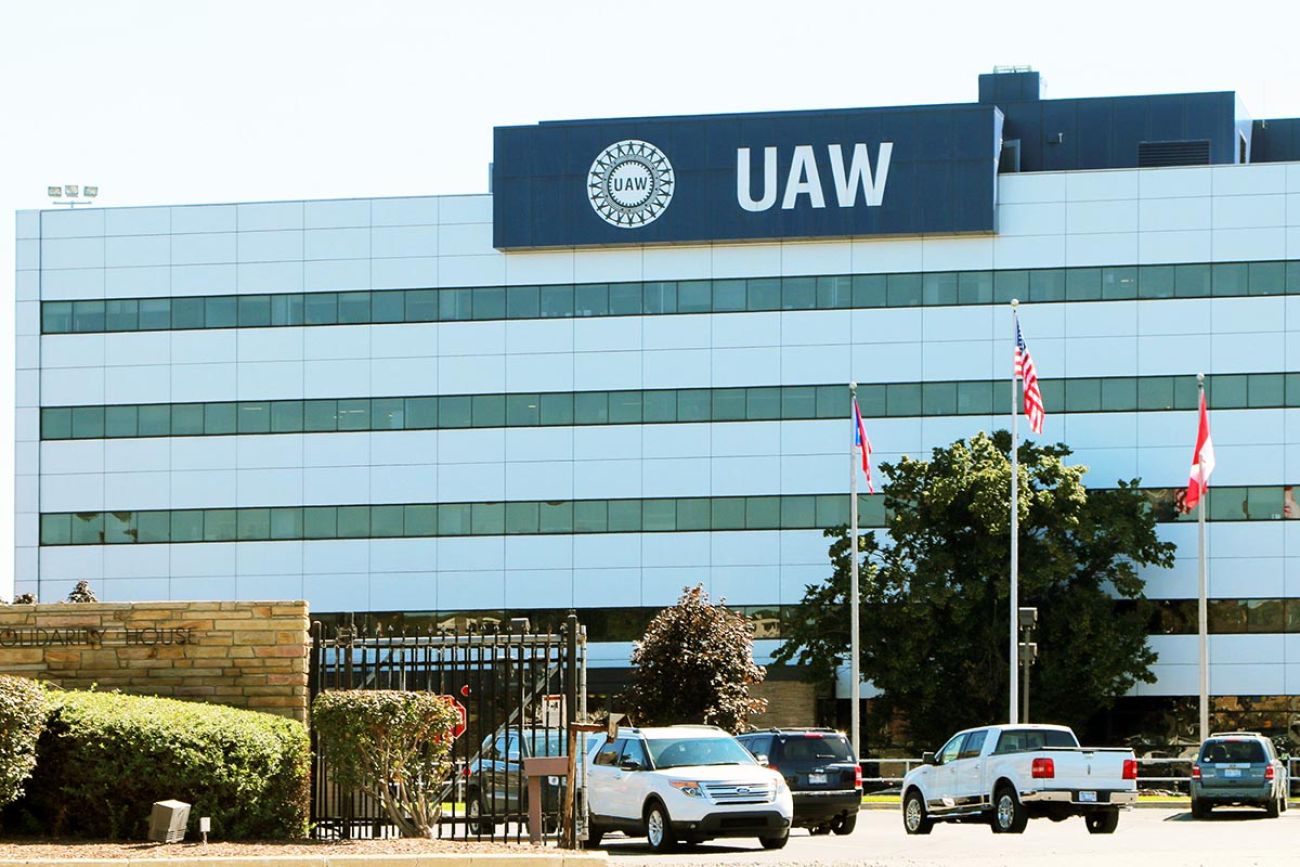Michigan braces for UAW strike as contract negotiations head to final week

- Contract negotiations between the United Auto Workers and the Detroit Three automakers are heading toward a Sept. 14 strike deadline
- The UAW is demanding higher pay, restored pensions, the end of a two–tier pay structure and a 32-hour work week
- Michigan business and political leaders are cautiously watching for signs a strike can be averted in the week ahead
Sept. 13: Strike likely; UAW plans staggered walkouts to ‘keep companies guessing’
Sept. 12: As UAW strike looms, what to know about contract talks, Big Three finances
September 14 (a week from Thursday) looms as a pivotal day for Michigan and its auto industry, as the national contracts with the United Auto Workers are set to expire that day amid escalating speculation that a strike may be unavoidable.
No significant public progress has been reported in the negotiations with the so-called Detroit Three — General Motors, Ford Motor Co. and Stellantis NA (owner of Chrysler brands), all with headquarters in southeast Michigan.
Michigan’s political and business leaders are watching the situation and bracing for a work stoppage that could take place among one or all of the automakers as automakers and workers try to balance demands for higher pay against the industry’s transition to electric vehicles which require fewer parts and, likely, fewer workers to make them.
Related:
- Report: UAW strike against Michigan’s Big Three could cost economy $5.6B
- In Detroit, tensions over Stellantis may rise with plan to boost truck traffic
- Survey: Young workers sour on auto industry jobs, in another blow to Michigan
“The next 10 days are very important,” U.S. Rep. Debbie Dingell, D-Ann Arbor, told Bridge Michigan. “I think very seriously that there could be a strike.”
If there is, she added, “This country is going to be reminded that the auto industry is the backbone of this country’s economy.”
UAW President Shawn Fain — sworn into office this spring vowing to take a more pugnacious approach with automakers — continues to say his members are ready to strike over demands that include higher pay, the end of a two-tiered wage system for newer workers, restored pension benefits and job security amid factory reconfigurations and closures.
Arguing that record industry profits haven’t been shared fairly with workers, the UAW also seeks a 32-hour workweek with 40 hours pay and a 46 percent bump in compensation over the next four-year agreement.
“Our goal is to bargain for a fair contract,” Fain said during a Facebook live address to members last Thursday, after they voted to authorize a strike. “But if we have to strike to win economic and social justice, we will.”
He added: “We are not afraid to use our power as workers.”
President Joe Biden said during a Labor Day appearance Monday that he doesn’t expect a strike to happen after previously urging “all sides to work together to forge a fair agreement.”
Biden is among few who publicly say there may not be a strike.
Sandy Baruah, president and CEO of the Detroit Regional Chamber, is among the many observers who appears convinced that the UAW is heading for a work stoppage, in part he said because the union’s demands don’t recognize the changed role and global competition facing the Detroit Three.
“Demands are so unrealistic there’s no other option for the UAW other than to strike,” Baruah said.
The tough rhetoric from the UAW “left no maneuvering room” for an agreement before the strike deadline, he said.
Michigan, home to about one-fifth of all U.S. auto production, has a higher concentration of auto manufacturing jobs than any state in the nation.
That would make a strike difficult here, Baruah said, as the impact trickles from an automaker to its suppliers and finally to stores and restaurants where auto workers spend money.
Gov. Gretchen Whitmer’s Democratic administration, which publicly supports the state’s labor movement and also its automobile industry, is monitoring the situation, press secretary Stacey LaRouche said.
"We are staying in close communications as negotiations for fair contracts continue,” LaRouche told Bridge Michigan. “In Michigan, we’ve proved that it’s possible to support working men and women, while also securing record-breaking economic development deals that will guarantee jobs and investment for decades.”
The UAW rejected Ford’s proposal last week, it said, while also filing unfair labor practice charges with the National Labor Relations Board against GM and Stellantis. The union accused the automakers of bad-faith bargaining.
Looking ahead, a strike — at targeted locations or company-wide — cannot be called before Sept. 14, said auto industry expert Kristin Dziczek in her blog for the Chicago Fed. On the other side, companies can initiate a lockout or hire replacement workers if the union strikes.
Despite the public posturing, a strike is not inevitable. If talks are productive, all existing contracts can be extended along with negotiations, Dziczek said. Or the UAW can switch gears and target a single automaker to sign a contract.
“I still believe it’s possible to reach a deal,” Fain said during his address to members.
Here is what’s at stake:
Economic impact
Analysis from the Anderson Economic Group in East Lansing estimated a 10-day strike among all three automakers could lead to $5.6 billion in national economic loss. That includes impact on light vehicle sales, which continue to rebound after the pandemic.
The most pressing risk for Michigan would be a prolonged strike, even if the target was one automaker and not the Detroit Three, according to University of Michigan economists in a report released Friday.
“The economic toll of a strike would be modest at first, but spillover effects along the automotive supply chain and other affected industries would accumulate as the strike progressed,” the report said.
A 40-day strike would likely impact 30,000 workers in the state by October, growing if it goes beyond that.
“We think all the jobs will return once the strike is finished so we think it would be a temporary setback to the state's economy,” one of the U-M forecasters, economist Don Grimes, told Bridge.
Michigan’s automotive suppliers are particularly concerned, said Dennis Devaney, senior counsel at Clark Hill law firm’s Detroit office. The attorney, who has 40 years working on labor disputes, as well as being a former negotiator with the NLRB, said he’s hopeful that negotiations can be extended, if necessary.
While larger Tier One suppliers, who supply products or services directly to the automakers, are most likely capable of withstanding a strike, smaller suppliers are more vulnerable to a slowdown that would constrict their sales. Many already have struggled for years as the automakers dealt with semiconductor shortages and shipping delays during the pandemic.
The potential for a two-month halt to production would compound existing problems, Devaney said.
“Layoffs would be legitimately a big concern for the supplier side,” he said.
But a broad spillover to other industries isn’t guaranteed. U-M economists noted that a roughly six-week strike against General Motors in Ohio in 2019 didn’t impact other industries.
“(It) lasted for 40 days, yet there were limited spillovers in Michigan’s labor market,” the U-M forecast said.
Outsized impact in the Midwest
Contract talks happen every four years at the three automakers, with this year’s negotiations affecting more than 150,000 workers throughout the United States.
Ford, GM and Stellantis produce just over half of all their U.S. vehicle output (40 percent of their engines and 75 percent of transmissions) in Illinois, Indiana and Michigan.
However, as Baruah of the Detroit chamber noted, market share for the Detroit Three has narrowed in recent decades.
A strike against GM in the early 1970s took place as the automaker has a 46 percent national market share.
“Now all three share roughly the same amount,” Baruah said.
Meanwhile, the economics for striking workers also will change: They would receive strike benefits of $500 per week, which was increased from $400 in February, Dziczek said in her blog. Pay would come from the UAW’s strike fund, which had about $825 million in august.
What automakers say
The Detroit Three issued statements ahead of Labor Day, with more information possible this week as the gap to the contract deadlines approach.
Stellantis most recently called bargaining discussions “constructive and collaborative,” following complaints that UAW demands were “a losing proposition” because their costs would make the automaker noncompetitive with its foreign, non-unionized competitors, The Detroit News reported.
Talks also are also focused, according to Stellantis spokesperson Jodi Tinson, on “reaching a new agreement that balances the concerns of our 43,000 employees with our vision for the future – one that better positions the business to meet the challenges of the U.S. marketplace.”
GM, in turn, said it was surprised and “strongly refutes” the union’s NLRB charge.
“We believe it has no merit and is an insult to the bargaining committees. We have been hyper-focused on negotiating directly and in good faith with the UAW and are making progress,” according to a statement from Gerald Johnson, GM executive vice president of global manufacturing.
The UAW presented nearly 1,000 demands to be resolved, Johnson said.
“Our goal remains the same - to achieve an agreement without a disruption that rewards our team members and protects the future of the entire GM team,” Johnson said.
Ford, meanwhile, publicized its contract offer late last week, saying it offered a 15-percent increase in compensation over four years in addition to cost-of-living adjustments and benefits increases. Its proposal said workers could go from $78,000 average wages — including overtime — to $92,000. It also said it would eliminate wage tiers that pay newer workers less than more-tenured employees.
“But we will not make a deal that endangers our ability to invest, grow and share profits with our employees,” CEO Jim Farley said in a statement. “That would mortgage our future.”
Fain criticized Ford’s offer during last week’s address to members, saying the offer also would allow the automaker to hire as many temporary (non-union) employees as it wanted.
“That ain’t happening,” Fain said.
The EV transition
Beyond pay, contract talks also touch on the uncertainty of future production and employment needs as the industry shifts toward EV production in the next decade. Recent deals for massive battery factories, including Ford’s factory in Marshall, may obscure expected job losses, since EVs require fewer parts.
The UAW seeks what it calls a “just transition” through its Working Family Protection Program demand, in which automakers closing a traditional factory would be required to continue to pay plant workers to perform community service work in that area instead of making them move to a new plant.
Yet Ford wants the next UAW deal to “give us the flexibility we need within our manufacturing footprint to respond to customer demand as the industry transforms,” Farley said in his recent statement.
“This is a very scary situation,” Steven Rattner, who led the U.S. automotive restructuring for the Obama administration during the Great Recession, said Sept. 1 in an interview with Bloomberg.
Many of the UAW demands are beyond any automaker’s ability to meet them, Rattner said.
Wage increases could make up for slower gains over recent years, he said. But the union’s proposed work rules — such as a 32-hour work week — could add inefficiencies to U.S. auto production.
Reducing productivity while raising wages, at a time when the auto industry is preparing to shift to manufacturing of EVs, could create fallout, Rattner said. Michigan and other other unionized northern states could be harmed in that scenario, based on his assessment.
“If you raise wages too much, then production will flow somewhere else,” Rattner said, suggesting un-unionized factories in the Southern U.S. or Mexico would benefit.
Business Watch
Covering the intersection of business and policy, and informing Michigan employers and workers on the long road back from coronavirus.
- About Business Watch
- Subscribe
- Share tips and questions with Bridge Business Editor Paula Gardner
Thanks to our Business Watch sponsors.
Support Bridge's nonprofit civic journalism. Donate today.
See what new members are saying about why they donated to Bridge Michigan:
- “In order for this information to be accurate and unbiased it must be underwritten by its readers, not by special interests.” - Larry S.
- “Not many other media sources report on the topics Bridge does.” - Susan B.
- “Your journalism is outstanding and rare these days.” - Mark S.
If you want to ensure the future of nonpartisan, nonprofit Michigan journalism, please become a member today. You, too, will be asked why you donated and maybe we'll feature your quote next time!




